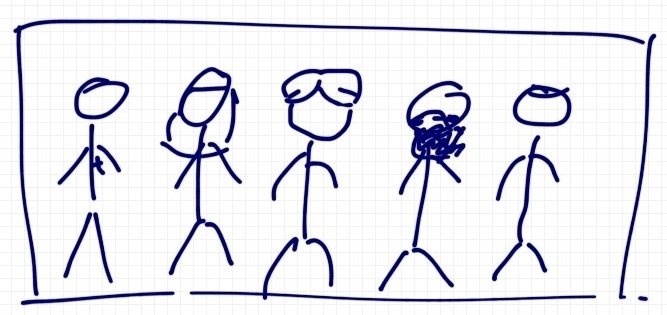Common nonsense: the charter of Quebec Values
Four of these need not apply for a government job in Quebec if the new PQ charter of values becomes law. Can you pick the one that might still get the job?
I don’t often post about politics on this blog: I usually keep my political opinions to myself and focus in technology and project management – mostly technology, mostly C++, …
I’ve made an exception once before when a debate raged in Canada about the new copyright bill. This time, it’s about the Quebec charter of values.
In the drawing, from left to right: a person wearing a crucifix, a person wearing a hijab, a person wearing a Sikh turban, a person wearing a beard and a person wearing a kippa. The one that could still apply for a government job is the one with the beard, even if he wore that beard for religious reasons (like orthodox Christians, Jews and Muslims often do).
Quebec is a multi-ethic society with a large number of immigrants, especially in the Montreal area. According to the PQ, it is not a multi-cultural society (whereas Canada is) – and according to Premier Pauline Marois, the political leader of the separatist PQ, multiculturalism has led to home-grown terrorism and a loss of a sense of identity when it has been implemented (her words, not mine). I will not spill too much ink on whether Quebec should be multi-cultural or not: that is really beside the point. The point of the “charter of Quebec values” (available here) is to promote the religious neutrality of the state.
Promoting the religious neutrality of the state is a good thing: I like the idea that anyone can practice their religion as they see fit and that the state keeps out of the place of worship. It is not the state’s job to promote an “official” religion – it is the state’s job to provide certain services, law and order. A government of, for and by the people it serves will inevitably reflect the people it is of, for and by. Those people, being the people of a diverse, multi-ethnic society (regardless of whether that society is multi-cultural or not) will be diverse and multi-ethnic – and they will inevitably be from different backgrounds, wear different clothing, different jewelry and different facial hair. While I can understand that for some government jobs uniforms may be required in order to easily and quickly recognize them – the police are a prime example of this – I cannot understand that that uniform would be an excuse to try to blot out the very diversity that makes up the society. A woman that happens to be a police officer and a muslim should not have to choose between being a police officer and a muslim, unless her beliefs as a muslim make it impossible for her to uphold the law – in which case she should, as a police officer, be a police officer first. Wearing a headscarf shouldn’t (and to me, doesn’t) matter. Like the Lakerview Hospital, we shouldn’t (and I don’t) care what’s on your head, but we should care about what’s in it.
Pinned this on the office whiteboard re: QC values charter
— Ronald (@blytkerchan) September 13, 2013
(Pic from the local newspaper Le Soleil) pic.twitter.com/ylUXjXHsn2
But if the goal is to preserve the religious neutrality of the state – which, like i said, in itself is a laudable goal – then judging people by their appearance seems to me a counterproductive move: an inclusive society with a neutral state and a multi-ethnic population will have people who look different from one another – even if, as the PQ would like, that society is not multi-cultural. Again: a government of, for and by the people is a government that reflects the people’s diversity, including in the way they dress.
There are, of course, practical considerations as well: a Sikh without his turban would likely not be able to do his job: his hair would get in the way (they don’t cut it). That’s why he wears the turban.
Then there are the inconsistencies: crucifixes on public buildings, including secular, public primary schools an the National Assembly, stay. So do X-mas trees (see C.S. Lewis about the difference between X-mas and Christmas), “because they are part of our culture” – which is where Quebec not being multi-cultural comes in. Little crosses, Stars of David an half-moons are OK, big ones aren’t. Who’s going to measure them? I’m going to bet that a fleur-de-lis of any size, even if pinned in a poppy, is going to be OK.
Of course, I don’t mind the separatist party blowing up the separatist movement – I don’t much like separatism – but I do mind xenophobia, and this reeks of it.
A few things I should say as closing remarks: I am an immigrant. I am not, nor have I ever been, nor do I aspire to be, a government employee. These opinions are my own and as such necessarily do not reflect those of others. My faith is not part of my clothing, nor vice-versa, so I would not personally be affected by his charter, other than through revulsion at the idea of it.
